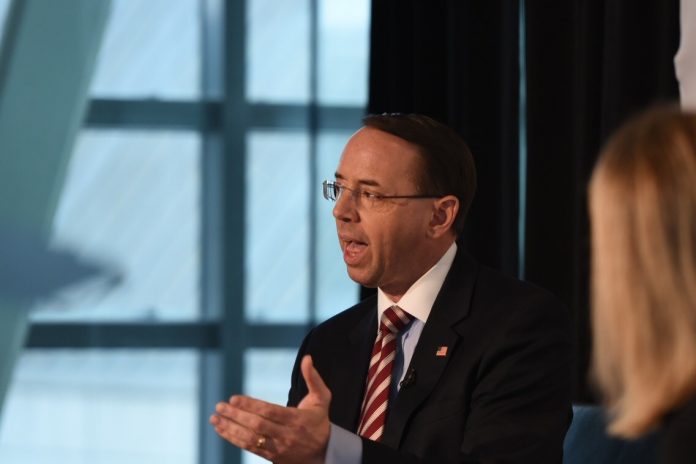The rumors of Deputy Attorney General Rod Rosenstein being fired and the redoubling of support for Brett Kavanaugh by the Trump administration, which both came to a head this week, are much more related than they may seem at first glance. Ousting Rosenstein will lead to Special Investigator Robert Mueller III having much less support from the Department of Justice while elevating Brett Kavanaugh to the Supreme Court would likely give Trump protection from prosecution from the highest court in the land. For Trump, making a continued investigation, and any legal consequences of that investigation, more difficult is the central project of his presidency-and firing Rosenstein while confirming Kavanaugh would both be in service of that goal.
Despite information from the last few days that suggests Kavanaugh may be a serial sexual assaulter, he is probably slightly more likely than not to be confirmed to the Supreme Court. Similarly, firing a deputy attorney general so that it would be easier to terminate a special investigation is unprecedented, but nonetheless a real possibility in the coming days or weeks. Rumors of Rosenstein’s firing reached a fever pitch earlier this week, but will likely return after the midterm elections. These two events would contribute to a growing awareness among the American people of the guilt and avarice of the Trump administration and indeed the Republican Party, but they would also inoculate the administration from the impact of that.
This would not create a constitutional crisis-that has existed since the Republican controlled Congress decided not to vigorously investigate Russia’s role in our election-but a deepening political one. The political crisis would take the form of a widespread awareness of profound criminal activity on the part of a President who has buffered himself from any potential prosecution. Firing Rosenstein would make it easier for Trump to put an early end to Mueller’s investigation and possibly even prevent a report from being made public, but it would also be close to being an admission of guilt. Mueller’s investigation, protestations by Trump’s most strident supporters notwithstanding, has not been a witch hunt as the special investigator has already won a major case with several others involved in the scandal taking plea offers from the government. It would therefore be apparent, and unavoidably so, to the rest of the population that any effort to terminate that investigation is being done to shield Trump from indictments that may well lead to him and his close family. A 5-4 conservative majority on the Supreme Court with Brett Kavanaugh vociferously arguing for a broad definition of presidential immunity would be a further insurance policy for Trump.
If Trump is able to succeed in creating a legal buffer by curtailing the Mueller investigation and getting Kavanaugh on to the Supreme Court it will be with strong assistance from the Republican controlled Congress. Republican Senators could have urged Trump not to nominate Kavanaugh, but to choose a conservative with a different view of presidential power and immunity, as that is not yet a partisan or ideological issue. Similarly, at any time in the last 20 months, either House of Congress could have begun a real investigation into Trump’s relationship with the Kremlin or passed laws seeking to protect the Mueller investigation. Their failure to do that only solidified their role as co-conspirators with regards to Russia, but also to the corruption that has defined this administration.
The rapid pace with which Donald Trump has consolidated his control over the Republican Party, which has contributed to Congress’s inaction, is one of the most important stories of American politics in the last two years. One way to see this is the influence Trump has in Republican primaries and the role that fear of having Trump support a primary opponent plays in keeping Republican legislators faithful to Trump. The Republican Party has not only abandoned many of its conservative principles in favor of Trumpism, but it is increasingly devoting itself to the central mission of the White House- keeping Donald Trump and his close family in power and out of jail.
In doing this, the Republican Party has tied their fate to that of Donald Trump and made the political crisis more intractable. In early 2017, there was still a scenario where anti-Trump Republicans could have taken the side of rule of law, democracy and thorough investigations into the Kremlin role in our election, but that is no longer a possibility. Instead, today the Republican Party has backed itself into a corner where they can no longer separate themselves from the White House. This could come to a head very soon because as Brett Kavanaugh continues to on the one hand proclaim his innocence while he simultaneously seek to prevent an investigation to find out the truth in the face of more accusations of sexual misconduct, the Republican Party risks being seen as advocating for a serial sexual assaulter simply because he is committed to protecting Donald Trump.
Lincoln Mitchell is a scholar, consultant and writer based in New York and San Francisco.
www.lincolnmitchell.com
Follow me on Twitter at: http://twitter.com/LincolnMitchell

